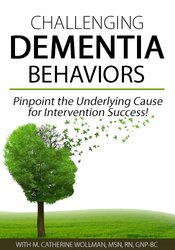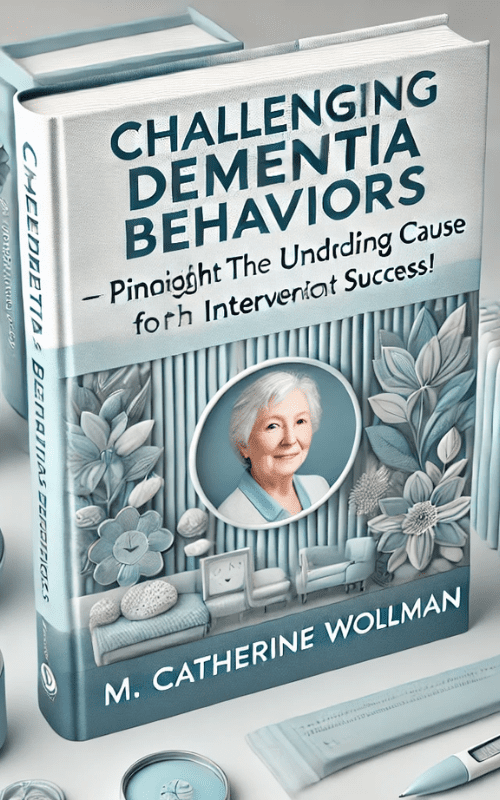Challenging Dementia Behaviors-Pinpoint the Underlying Cause for Intervention Success! – M. Catherine Wollman
Challenging Dementia Behaviors-Pinpoint the Underlying Cause for Intervention Success! – M. Catherine Wollman has the same quality as the author’s salapage.
Overview
Salepage check: Challenging Dementia Behaviors-Pinpoint the Underlying Cause for Intervention Success!
Author: M. Catherine Wollman
- Faculty:
- M. Catherine Wollman
- Duration:
- 3 Hours 43 Minutes
- Format:
- Audio and Video
- Copyright:
- Jan 12, 2018
Description
Intervening when it comes to dementia behaviors is no easy task! You are expected to provide compassionate care while achieving optimal patient outcomes, maintaining a secure/safe environment, while at the same time recognizing that the healthcare team may well be suffering from compassion fatigue symptoms themselves. This video based training by Catherine Wollman, DNP, CRNP, GNP-BC, will give you the tools to regain some control in the day. With new and effective tips and ideas, you can help patients and families to identify the underlying cause of the presenting behavior. Armed with that important information, a plan can be devised to decrease the overall incidence of the behaviors that have become a concern. Don’t delay….you will return to work, armed with a brand new skill set to truly provide assistance for your patients with dementia!
Handouts
| Manual (1.17 MB) | 92 Pages | Available after Purchase |
Outline
Essential Assessment of Mental Status and Baseline Function
- Early recognition and diagnosis of dementia
- Screening
- Mental and functional status assessment
Types of Dementia: Neurocognitive Disorders Common Medical Problems and Syndromes
- Atypical presentation of illness
- Delirium: Prevention, treatment, outcomes
- Preventable hospitalizations
Behavioral and Psychological Symptoms of Dementia
- Common behaviors
- Best practices: Non-pharmacologic interventions
- Pharmacotherapy
- Unique behavioral challenges
- Interdisciplinary care for patients and families
Advance Directives for Patients with Dementia
- Individualized goals
- Palliative care and hospice for end stage dementia
Future Direction of Dementia Care
- National agendas
- Research
- Culture change
Faculty
M. Catherine Wollman, DNP, CRNP, GNP-BC Related seminars and products: 3
M. Catherine Wollman, DNP, CRNP, GNP-BC, has been a gerontological nurse practitioner for over 30 years, caring for older adults in acute care, long-term care and home care. Catherine currently provides geriatric consultation services. Her expertise is often sought for the care of particularly challenging dementia cases.
She worked as the director of senior health for a large hospital system offering a full spectrum of services, including comprehensive interdisciplinary dementia care. Catherine has travelled the country, offering her clinical expertise through various trainings to experienced healthcare audiences. Additionally, she has published articles and book chapters about relevant issues affecting older adults.
Speaker Disclosures:
Financial: M. Catherine Wollman is a visiting professor with Chamberlain College of Nursing. She receives a speaking honorarium from PESI, Inc.
Non-financial: M. Catherine Wollman is a member of the Gerontological Advanced Practice Nurses Association.
Curriculum
FAQs
Requirements
- Basic understanding of dementia care or related healthcare fields.
- Internet access and a digital device for course content delivery.
- A willingness to learn advanced techniques for dementia behavior management.
Features
- Comprehensive Approach: Learn how to identify and address the root causes of dementia behaviors effectively.
- Expert Instruction: Taught by M. Catherine Wollman, a renowned expert in dementia care.
- Flexible Learning: Digital format allows learning at your pace and convenience.
- Evidence-Based Strategies: Access tools and techniques backed by clinical research.
- Practical Applications: Designed for immediate implementation in professional and personal care settings.
Target audiences
- Healthcare professionals, including nurses, caregivers, and therapists, focused on dementia care.
- Family members and at-home caregivers seeking effective solutions to challenging dementia behaviors.
- Administrators and educators in elder care facilities aiming to enhance staff training programs.


